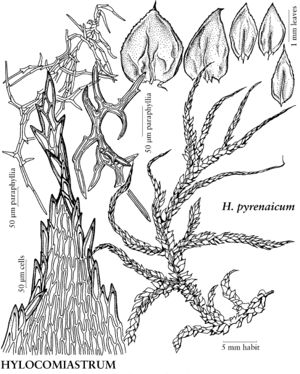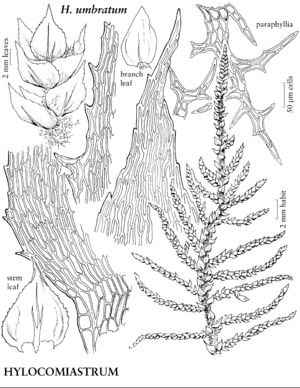Hylocomiastrum
in H. G. A. Engler et al., Nat. Pflanzenfam. ed. 2, 11: 486. 1925.
| Taxon | Illustrator ⠉ | |
|---|---|---|
 | Hylocomiastrum pyrenaicum | Patricia M. Eckel |
 | Hylocomiastrum umbratum | Patricia M. Eckel |
Stems creeping, 1–3 mm wide across leafy stem, sympodial, remotely and irregularly pinnate to regularly 1-pinnate or 2-pinnate; paraphyllia many, base multiseriate, branches 1-seriate or 2-seriate. Stem-leaves erect to spreading, heteromallous, often remote, broadly ovate, ovate-deltoid, or ovate, strongly plicate (often obscuring costa), not rugose, 0.8–2.5 mm; base not cordate-clasping, not to somewhat decurrent; margins serrulate to nearly entire basally, spinose-serrate to serrate in distal 2/3; apex acute to acuminate; costa single, double, or rarely triple, sometimes 2-fid, 1/3–3/4 leaf length; alar cells not differentiated; laminal cells smooth. Branch leaves ovate to lanceolate; costa single, double, or 2-fid, 1/2–3/4 leaf length. Capsule inclined to horizontal; operculum conic; exostome teeth irregularly cross-striolate to somewhat reticulate proximally; endostome segments narrowly perforate.
Distribution
North America, Eurasia, n Africa, cool temperate and boreal regions
Discussion
Species 3 (2 in the flora).
Proximal stem and branch leaves of Hylocomiastrum are distinctly shorter than the more distal and have nearly entire margins, acute to bluntly apiculate apices, and weaker costae. Hylocomiastrum differs from Hylocomium, with which it is often combined, in having shorter-branched paraphyllia, strongly plicate leaves, strong costae that are often single and end in a spine, smooth laminal cells, endostome segments with narrow perforations, and conic-apiculate opercula. The third species in the genus, Hylocomiastrum himalayanum (Mitten) Brotherus, is known from Asia.
Selected References
None.
Lower Taxa
Key
| 1 | Stem leaves erect to erect-spreading, loosely imbricate, ovate to elliptic-ovate, usually longer than 1.7 mm; branch leaves longer than 1.2 mm; costae single. | Hylocomiastrum pyrenaicum |
| 1 | Stem leaves erect-spreading to wide-spreading, distant, broadly ovate to deltoid, usually shorter than 2 mm; branch leaves shorter than 1.2 mm; costae usually double in stem leaves, single in branch leaves, but variable. | Hylocomiastrum umbratum |
"nearly" is not a number. "single" is not a number."broad" is not a number.